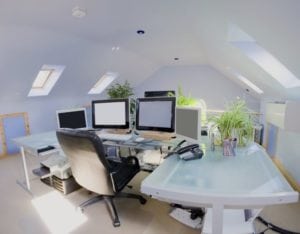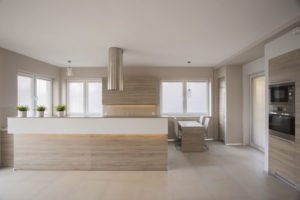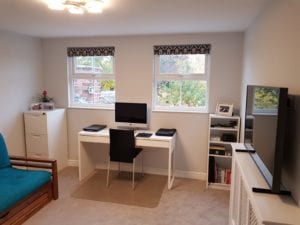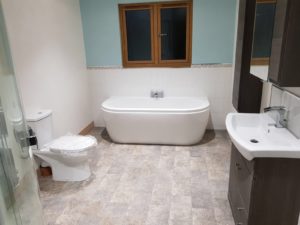Home offices are fantastic for boosting productivity by providing a dedicated space to concentrate on work. They also make working at home easier and more appealing, as an office space is often far more comfortable than sitting in a lounge or kitchen.
If you’re considering building a home extension, we have some top tips of elements to include, before you even start thinking about the details. From space to lighting, our expertise can help you design a home office that makes the most of the available space to create the ultimate relaxing yet productive workspace.
Open space
You wouldn’t find many workplaces that didn’t allow some space to move around. Whilst most home offices are small in design, as they’re usually fitted into unused areas of the home or added onto a house as a small extension, it’s important to not feel as though you’re as squashed in as a goldfish in a shot glass.
Without some open space, not only will it make you dislike using your home office, you can easily become cramped and uncomfortable without the ability to move around inside the office. Plus, if you rely on walking around outside of the office when you need to move, you may find that you’re easily distracted by other people inside the house.
Away from living areas
Whilst working from home can mean it’s convenient to put the washing on or do other chores that you wouldn’t usually get time to do in the week, it’s usually more important to have as much focus as possible. To avoid getting distracted, plan your home office build to be situated away from rooms you could easily pop into to get things done at home.
Similarly, if there are likely to be people in the rooms adjacent to your home office, noise from their conversations or them going about their own tasks can also be distracting, so if possible make sure that your home office, or position of your workstation in your home office is as far away from other sounds as possible.
Storage for keeping your office tidy
When you’re planning the architecture of your home office, consider where items of furniture are going to go on a floorplan. If you have lots of folders and papers, it might be useful to plan for filing cabinets or cupboards to store these in. The alternative is relying on desk or floorspace for your files, which is a recipe for messiness.
A clean and tidy space is conducive to a relaxed environment, which will serve you far better than stress caused by mess.
Somewhere to sit away from the computer
In an ideal world, you should plan some space away from your computer in your home office. This can be extremely useful for concentrating on reading something or mapping out a project or task, away from the distractions of your computer.
Natural lighting
Finally, one of our best tips is to make sure that you have access to natural light. Even if you’re facing a wall, something like a skylight can make a home office feel far more spacious
whilst simultaneously creating a lighter, brighter atmosphere.
Whether you choose to work from home or you have to, your home office should make you feel just as happy and productive as a corporate office – if not more so. At the same time, by planning the build of your home office and its situation by taking the above tips into account, there’s no reason why working time spent in your home office will become even more productive, too.
Experts in home extensions
If you’re thinking of building a home office onto or into your house, speak to an expert at the planning stage. We’ll help you to confirm that your office makes the best use of space and can advise about the best ways to build a home office, too.
To speak to local expert home extension builders today, call us on 01509 734550 or email us using our contact form.




